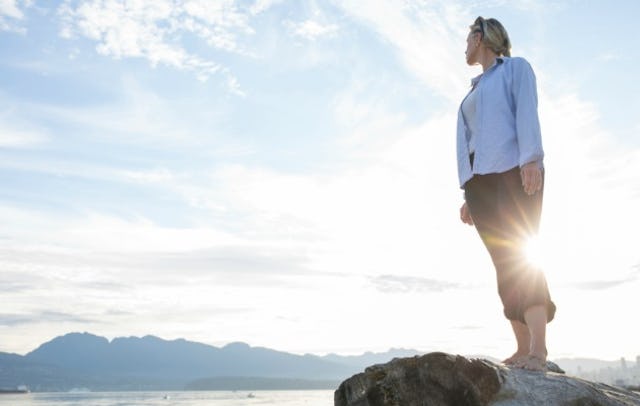What About Me?

“I love you,” I call out, closing the door behind my teenage daughter.
“I love you,” she responds casually and hops into the waiting car. I watch her drive off and then turn away from the window, even though I do want to stay there until she comes home like a dog who’s been left alone. I have the house to myself.
Again.
Until a year ago, an empty house was a rare luxury. I would flop on the couch with a book and a cup of coffee, indulging in the rare silence. Now, however, my daughter is a teenager, and she doesn’t need me in the same way as before. She now wants and needs more independence and doesn’t want me to be her chief organizer and problem-solver anymore. Although I still love to share my hard-earned wisdom, it’s often met with the lethal eye-rolls that all teenagers have perfected.
It’s not fair. I invested a lot of time and effort in parenting. When members of my generation finally did settle down, we embraced parenthood like a competitive sport. We hovered, intervened, photographed and shared our children’s accomplishments, blending our identities with theirs in ways that were unthinkable to previous generations.
Now, it’s over. Parenting—which seemed endless when I was mired in the overwhelming swamp of toddlerhood—now seems to have a definite conclusion, and I’m left to figure out what to do with the rest of my life.
“What about me?” I want to scream every time my daughter leaves the house, but I don’t. My brain has retained at least some measure of common sense underneath all the self-pity. Life is not going to return to what I would like to call “normal,” and I need to follow the advice of exasperated teenagers everywhere: I need to get a life.
I started by researching what other women feel and do as their children leave home. Most of what I read focused on leading more quiet and reflective lives with many long discussions about weight gain and menopause. I know that I’m supposed to say that the prospect of an empty nest is sad and terrifying and that I fear the inevitable decline of old age.
I do feel all of that.
My feelings, however, are more complex: less reflective and more restless. I also feel a bubbling excitement at this unexpected opportunity to open a new chapter in my life.
While I do consider the possibility that I may be swimming in denial, I feel ready to dive in both literally (I always wanted to try SCUBA diving) and figuratively. I’m looking forward to travel in the fall and winter without considering school breaks, and I’m excited about dinner with my husband without glancing at the clock, waiting for my daughter to bolt out the door to the next extracurricular activity. After keeping my focus inward toward the family for many years, I now get to lift my gaze and peek outside.
It’s sad when our kids leave home, but members of my generation are still young. Well, youngish, at least. Once we get over the shock of a quiet and empty house, I believe we’ll be a force for good as well as some juicy, fun times; we can’t all spend the remainder of our lives reminiscing about our youth and worrying about our weight. We now have the opportunity to do all the things we postponed when we were raising our families: We’ll climb mountains, swim with dolphins, and transform the world.
I feel different from my younger self, and I’d like to think I learned a few things along the way. Like all profound experiences, parenting transformed me: It smoothed some of the pointier parts of my personality and made me less arrogant. I know myself better these days, and I’m less susceptible to pressures from my environment than I was earlier in life when I was more desperate to conform to expectations. Adulthood has made me more independent and less fearful of failure, which might bode well for the future.
I also have enough self-awareness to know that I may dissolve into a depressed puddle of tears after my daughter leaves. Nobody ever said that an empty nest is free from complexities.
Now, my daughter is flapping her shiny new wings, eager to be on her way, while I hover, fearful of the lurking dangers, wanting to keep her under my protection and knowing that she needs to leave. My own wings are old and their battered feathers stick out, but on good days, I feel like I too can soar into the wide open world once again.
“I love you,” I’ll whisper as she flies away. Then, I’ll see what my old wings can do.
This article was originally published on